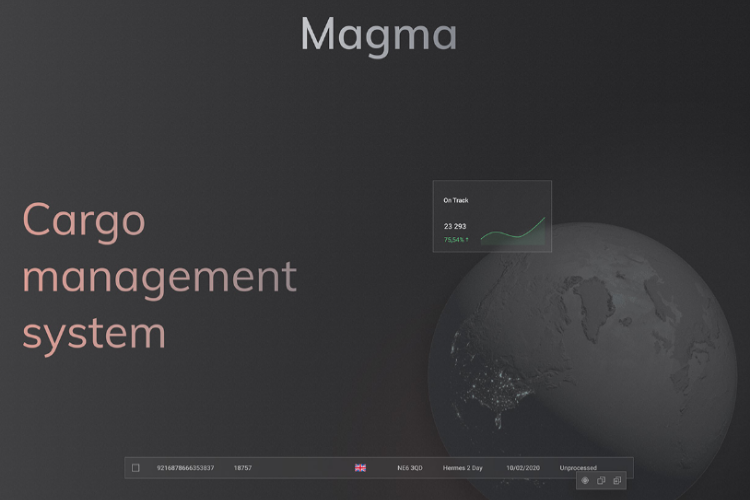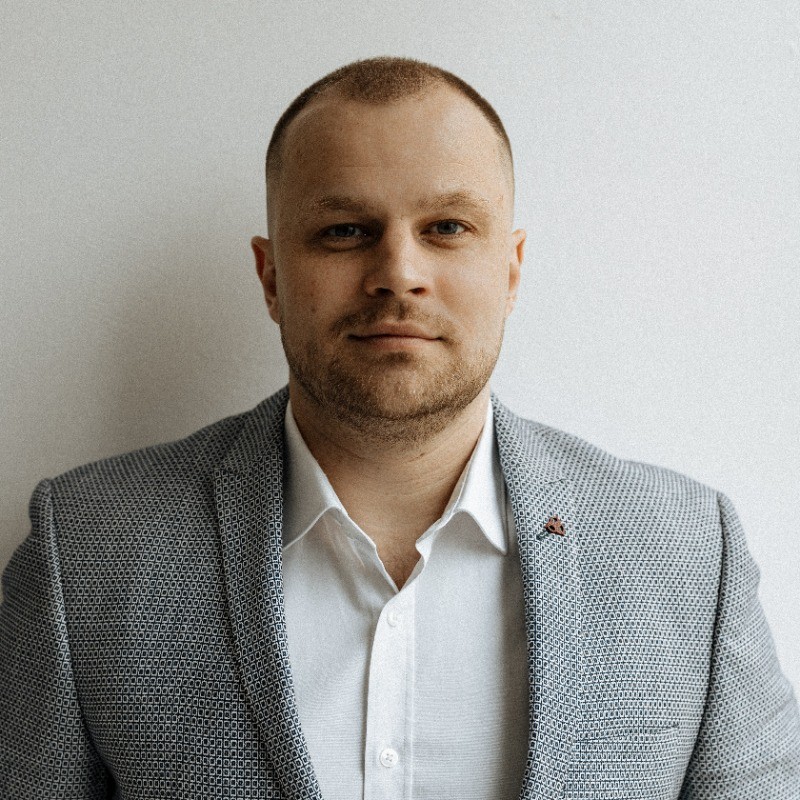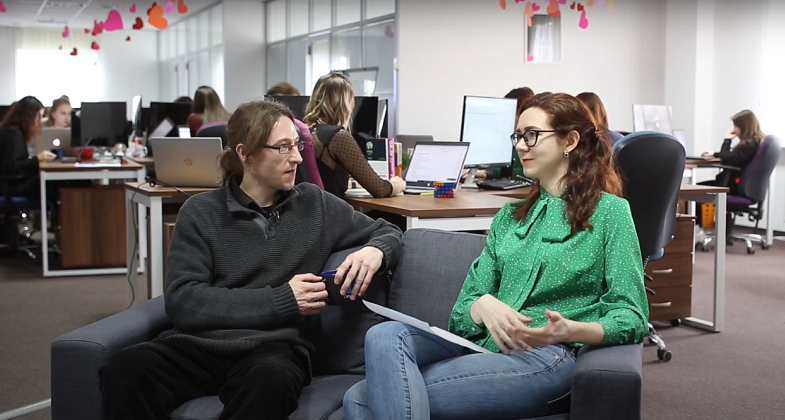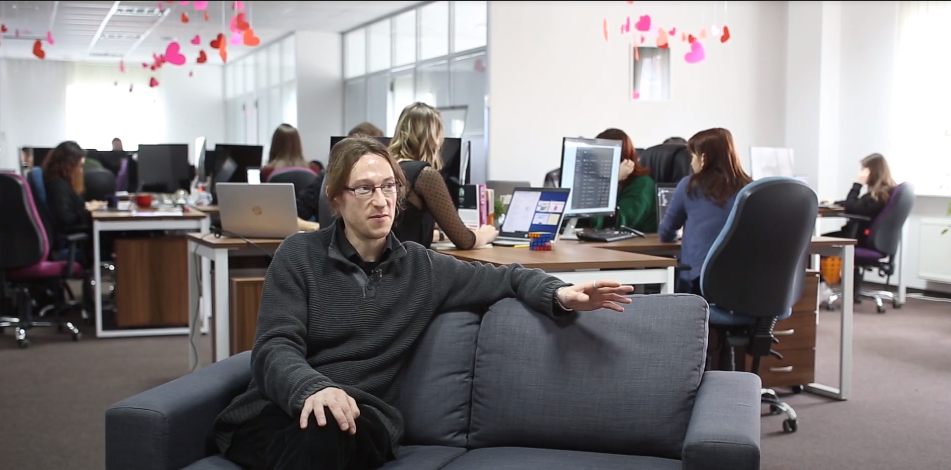Table of content
We were lucky enough to shoot a few interviews before the Covid-19 pandemic.
The first interview was dedicated to hiring a remote team in Ukraine.
Q: Hi, Andy! Could you please tell us a few words about yourself and your project?
I’m Andy Morrey. I am the Managing Director of a company called Magma Trading Limited in the UK, and we are a software development company in the logistics sector.
We started out about 10 years ago on a very simplistic level, creating labels for consignments to send parcels almost exclusively inside the UK as a domestic market. As contacts have grown and business grows along with that, we started sending more parcels over into Europe and other sections of the world.
And we are now at the stage where we’re trying to crack into the Asian market or the US market to grow our business as well alongside partner companies. So that’s how it started.
We are now aiming to move into more of a TMS system, a transport management system, to give users more control and more of a holistic view into their own world of consignments and logistics and transport. And also to keep up with market forces and competition that’s around.
There are quite a few companies that offer similar services and are admittedly perhaps ahead of us in the game. So we’re playing catch up to a slight degree.
But surely this affects every single company in every section of the industry across the market. So, adapt or die.
Q: Do you have a distributed team?
We do. There is an office where we work closely with a third party partner company. And we are almost their exclusive providers. However, our team Magma Trading is completely remote and distributed. We have various people working with the company. And I would say only 2 people are in the same postcode at one time.
Q: Why did you choose to hire a remote team for your project now?
Honestly, it was because of expense primarily in the UK. It’s very very costly and bureaucratic to try to employ somebody on a permanent basis.
Оnce you’ve made that commitment with one person, you are almost stuck until they decide to move on to a different area of their career or their life. It’s possible to do it on a contract level, on temporary conditions.
However, largely, employees find that instability very nerve-wracking and would prefer to have a commitment to a full-time job for their own security and prosperity as well for the future and obviously more typically, families or the right to suit their own lifestyles.
So these obstacles were that big that it wasn’t possible to find somebody within the time periods that we needed to develop the software or the system that we’ve already created. It would have made it prohibitive for us to try and procure somebody in the United Kingdom. We would have to wait until next Christmas and pray to Santa “Please deliver it!”
Q: What is your attitude to outsourcing? There are lots of people who do not trust this kind of relationship between companies. For example, because of unreliable vendors.
I think people get seduced by the costings, they do it because it’s cheap. They jump on it because they think they are getting a brilliant deal, but we have another phrase in England that if something’s too good to be true, it generally is. So, yes, try with caution. I would suggest it.
Q: Why did you choose Ukraine to outsource your project?
Initially, it was the pressure of shareholders and investors, and our company as well. He would drive the timescales of development and progression of the system and the introduction of the new features. So it was coming incredibly important that we found another set of resources very very quickly.
I did the research myself, and as it is often the best way to discover what market you want to work with. Poland was the one who cropped up as the top one. I believe Poland is becoming the most popular at the moment. There have been places in Estonia and Latvia, these kinds of Eastern European countries are very popular for outsourcing. We’ve covered China and India as well, which are also popular, but not my first preference because of time zones.
And it was more like a shooting gallery to see which one you hit. So I contacted various companies, about 10 in total, to feel the market who will be a good fit for us. And about 4 companies responded to my introductory emails. And you were the fastest. And we had an introductory conversation over the Internet, remotely. And it was impressive enough for me to give you a chance.
Q: What were your criteria for outsourcing partners?
Obviously, the skill set. It is incredibly important. Logistics isn’t particularly technical. So a company had to have a good reach of resources and a good spread and good variations. And again, you guys tick the boxes. You’ve got a good taste for graphics, which was the initial first phase of the project. So it was more a little test to see what your capabilities were.
Now we are moving into the next phase of the relationship. And I came over to visit and be introduced to the team and see for myself the professionalism and array of the skills you have to offer. It is fantastic for our company as well because now we have the reliance and knowledge base in almost every area required to propel us further on the market and become serious competition.
Q: How much time did it take from your first contact with our company to hire a team for you?
It was probably about 2 weeks. We have I think, 2 or 3 introductory conversations. First one who are you, what are you doing, almost like a blind date kind of television share. But then we got more into the meat, of what was required for our project moving forward. So we had more technical discussions over these couple of weeks.
Q: Which engagement model did you choose for your company?
It was on an hourly-based contract. That was the basic model that would fit our profile. But as we move on, using more and more time in your company, and more resources, that model becomes less attractive. I have been sure that there are other options to commit more fully. And it will be more beneficial both ways.
Q: So, you have a distributed team. Is it hard to manage it?
We need a lot of trust because they’re remote and they’re working from their own homes.
I prefer working remotely rather than having to drive to an office every day. And being a computer geek, it’s normal to talk to machines more than with people, so it was not anything out of ordinary for me. It is more natural for me to work remotely. So, I did not find difficulty at any or any kind of obstruction managing everything remotely that suits my person as well as lifestyle down to a T.
So it felt very natural to continue along this line. And it makes a lot more sense to have an outsourcing company remotely working. Yes, I do see the benefits and I think it’s very important to have a physical connection with people as in a face to face meeting because there are things that you can do in half a day sitting next to somebody that would take a week trying to communicate remotely over Skype.
We are a distributed team, however, there are very few weeks that we don’t see each other face to face. But it’s because of the industry, the nature of the beast. It is a 24-hour cycle.
Q: So what was your biggest concern about outsourcing?
I was nervous because we have never experienced it, even though we have a distributed team. I’m sure with everything in your life, if you’ve never experienced it before, you have no idea what to expect. So obviously, it’s a long way away. Thousand miles between England and Ukraine. What would happen? Is it a waste of time? Is it a waste of money? Am I doing the right thing?
There are so many different countries that offer this kind of work or this kind of business and industry. Have you picked the right one, you know which horse does better, which one is going to bring you the trophy? So you just want the reassurance that your decision has been the right one.
But I wasn’t overly worried because it is such a dedicated practice. It’s already in place. Everybody does it. And everybody screams from the rooftops and lavishes that with praise because of its flexibility. You’ve got more exposure to different technologies and resources than you ever would with just one person unless I can somehow crack cloning to get another me to sit next to me.
But because of the resource pool available and already established companies such as yourselves, it just made a lot more sense to me. Put your money where your mouth is, this is what we say in England, and jump into it and make a commitment. So now here we are.
Q: Now, when you are more familiar with outsourcing can you give some tips for those who are hesitant about outsourcing? How to check the outsourcing vendors?
You will analyze, think about it and make a common-sense gold decision based on experience, and your own proficiency and your own skills set, managerial capacity. So, it’s a very personal decision as well as a corporate one.
Whether to outsource? Is that right for you financially? Is it right for you resourcewise? Because you have already got your resource pool available to you. With us, we had none of that stuff so it makes sense to outsource.
I wouldn’t suggest there’s anything to worry about. But I can understand from the aspect that people have had bad experiences with these subject companies before. So understandably, people are gonna be nervous about this kind of foray into the market. As I say, with every aspect of your life, just use a bit of common sense.
And I would suggest these introductory talks have been very useful from the aspect of gaining that confidence and giving us that comfort to make it more of a permanent commitment.
Q: How do you feel about Devox Software?
I’m very impressed, I was not really aware what to expect when I first came here.
It’s actually bigger than I first imagined. I thought it would be a far smaller team, maybe a pocky little office.
These are just our own misconceptions because of media or exposure on television. I mean, we’re not neighbors. It’s not like us in France where you know each of the back to front just because of the proximity. So I wasn’t quite aware of what to expect.
However, yeah I’m blown up with the level of professionalism that’s been shown, as well as the welcoming nature and the social aspects. You all seem to be really on the ball technically.

Devox Software was to create a design system for Magma Trading. Check the full case at our Behance profile.
Q: Thank you for your interview.
No problem.Thanks.














